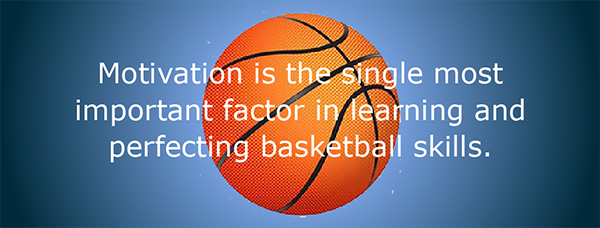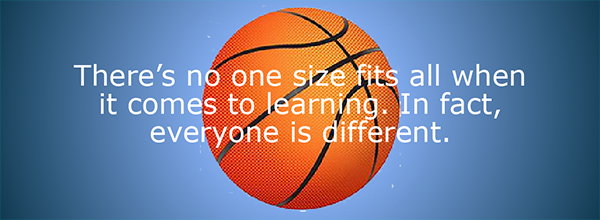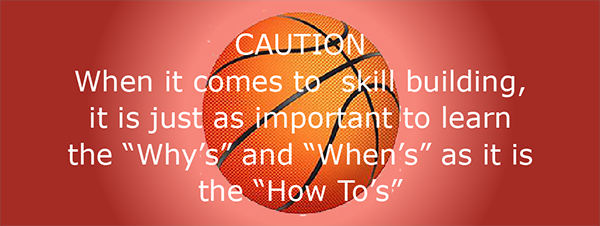- Offensive Techniques & Strategies
Motivation & Learning
What to Discover or Recall:
Discover that motivation is the most important factor in learning.
Realize that learning is best when it is fun.
Understand that basketball skills and techniques must be learned and practiced at game speed.
Repetition is a must for motor skill learning.| Motivation | Learning | Motor Skill Learning |

Motivation

Motivation improves a player's:
Desire and Performance
Determination and Persistence
Intellectual & Mental Learning
Initiative & Resourcefulness
Motivation can be either self-curiosity or desire to know (intrinsic) or a definite need to know (extrinsic). In basketball, self or intrinsic motivation is the most effective and long lasting. Motivation is definitely enhanced when:
the player possesses a contagious excitement and commitment for the game.
the teaching environment includes adequate facilities, and equipment that are conducive to learning.
the coaching staff encourages and fosters the desire to want to learn and achieve on the part of the players.
the players are surrounded by good people, and poor behavior and distractions are not ignored or tolerated.
every player on the team is given definite roles and responsibilities that are incorporated into a total team effort.
Motivation is the force that initiates, guides and maintains behavior and habits. It is what causes everyone to get started. The key to get motivated is to make it easy to get started. However, it is much easier to finish a task that it is to start it. Most players struggle and find it difficult to generate the motivation needed to get started and achieve their goals. However, if they have a schedule, they will generate the willpower and desire. Having schedules also makes decision making automatic.
Player motivation can be also influenced by reward and punishment. However, both reward and punishment are more harmful than helpful. They are temporary and counterproductive. Once reward or punishment is no longer provided, behavior reverts back to its original state. As a result, in basketball, it is much better for players to be self-motivated anxiously looking forward to practicing rather than a fear of going to practice.

Learning

Learning is best when . . .
... it is appropriate to the emotional and physical maturity level of the players.
... the physical and social environments are conducive for learning.
... the coaching staff is enthusiastic, well versed and knowledgeable.
... it involves strong support and encouragement (under-achievers will excel on occasions, while the talented are consistent).
... it includes activities using as many senses as possible. Learners remember 10% of what is read, 20% of what is heard (75% is forgotten after 2 days), 30% of what is seen (majority of learning), and 50% of what is heard and seen.
... it is sequential and logical, progressing from concrete to more abstract concepts (one on one skills before five on five skills).
... it involves activities that are appropriate to the specific situation. The best way to learn basketball is to practice BASKETBALL.
... it involves constant repetition and practice using correct techniques.
... it is purposeful and fully understood by the learner (boxing out on rebounds).
... it is the result in functional understanding. Players must gain a working knowledge of the game (what, when and why should be very clear and specific).
... it encompasses the teaching of knowledge, psychomotor, attitudinal, and confidence skills to develop the complete player. Attitude skills are the toughest to achieve.
... it is FUN.

Motor Skills Learning
The learning and perfecting of basketball skills require active active and purposeful participation on the part of the players. However, to be effective, these basketball skills and techniques must be learned and practiced at game speed. Many factors affect the rate which basketball players learn the skills of the game. The primary findings derived from research in motor learning are as follows:
Motivation - motivation is probably the single most important factor used in acquisition of basketball skills.
Conditioning - motor learning is directly dependent upon physical conditioning. Superior conditioning does not just happen nor is it acquired quickly. It is the result of a well planned and executed program of exercise, rest, and diet with rest and diet being just as important as exercise.
Progression - motor learning takes place from the general to the specific. Players must master the fundamentals before more complicated skills can be learned.
-
Specific - motor learning is specific. Skills must be learned at the same speed which they will be performed during a game.
Practice - repetition is a must for motor learning. The greater the number of times nerve impulses are sent over the nervous pathways, the more firmly established they become until what has been practiced becomes automatic or a habit.
-
Correct Techniques - proper execution is important. Since bad habits can be practiced as well as good ones, it is imperative that players begin building correct habits from the start. Pay attention to detail. Precise execution and footwork are vital.
Tension - learning is best accomplished under conditions of limited stress and emotional pressure. If the tension level is too low players are apt to become lackadaisical. There is also evidence that most properly prepared teams have a high tension level at game time.
Participation - motor learning demands active and purposeful participation on the part of the players. The best way to learn basketball is to practice BASKETBALL.
Mental practice - motor learning also requires visualization and mental practice. Players should think about the skills and intricacies of the game. More learning and improvement takes place if this is done between practice sessions.
Progressive - new techniques replace older ones as motor learning progresses. The highest level of motor learning is that level which learning is related to the individual in such a way that the knowledge enables him to become self-disciplined.

Return to Player Prerequisites - Click Here
Return to Player Development and Performance - Click Here
© 2026 HoopTactics All Rights Reserved.
